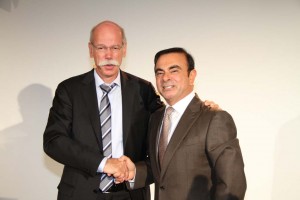
Daimler Chairman Dieter Zeetsche and Renault/Nissan CEO Carlos Ghosn celebrate the expansion of their 30-month-old alliance.
Just about anything is possible as Daimler, Renault and Nissan announce yet another big expansion of their global alliance – except for the possibility of a full-out merger, the CEOs of the three makers said during a joint Paris Motor Show news conference.
The partners have rapidly added a wide range of new projects since first revealing a limited series of joint ventures in 2010. The latest move will see Daimler, Renault and Nissan jointly developing a new generation of compact engines while also sharing transmissions.
Meanwhile, Daimler could announce an even more expansive program before year-end that would have it share in a new assembly complex Nissan has already announced for Mexico.
“Over time, we have built up so much trust we are working like hand and glove,” declared Daimler Chairman and CEO Dieter Zetsche, sitting alongside Carlos Ghosn, the CEO of both Nissan and Renault, who expressed similarly upbeat sentiments about an alliance the partners expect to save billions of dollars in the coming years – while also helping the makers rush new product to market at a faster pace.
Renault and Nissan have been partners in an alliance since just before the start of the new Millennium, one that is credited with saving the Japanese automaker. Ironically, it is now Nissan helping Renault deal with the collapsing European auto industry. Daimler came aboard three years ago in a move that surprised many industry observers.
Ghosn stressed that the partnership works, in part “because we do not compete” directly in most segments of the market – though the very first product of the alliance might challenge that assumption. The new Mercedes Citan city van will be an upscale version of the next Renault Kangoo. Meanwhile, the partners are finishing up development of new microcars that will be sold as the Renault Twingo and a 4-seater for Daimler’s struggling Smart brand, the forfour.
“We still have plenty of ideas in the pipeline,” noted Zetsche, even though the three-way alliance already involves everything from future powertrains to luxury car platforms. One of the more expansive efforts already underway will see Nissan produce small engines at a Tennessee factory for use in Mercedes sedans assembled in Alabama.
Zetsche and Ghosn, meanwhile, confirmed they are discussing the possibility that Mercedes will add its own wing to a major manufacturing complex Nissan has already announced for Aguascalientes, Mexico. First reported by TheDetroitBureau.com, the deal would allow both to take advantage of shared supplier and distribution networks, among other things.
(For more on that story, Click Here.)
The two executives stressed that don’t check a ledger sheet deciding on new ventures to ensure each will get the same level of savings. But both makers know that they each have to share in the benefits, long-term.
In a session remarkable for their unanimity of opinion, both Ghosn and Zetsche agreed that a key reason the three-way alliance has so far worked — while most others fail — is the strong involvement and support of top management, all the way up the corporate ladder. But Zetsche added that a survey of Daimler employees found a generally positive feeling for the way the partnership is working.
Asked what deals might follow, Zetsche suggested, “Nothing is off limits,” then corrected himself to say that the partners have firmly ruled out any additional cross-holdings beyond what was announced 30 months ago.
In a reference to the German maker’s near-disastrous, decade-long marriage to Detroit’s Chrysler, Zetsche said, “Perhaps referencing our history, we are glad we don’t have a merger” with Renault and Nissan.
